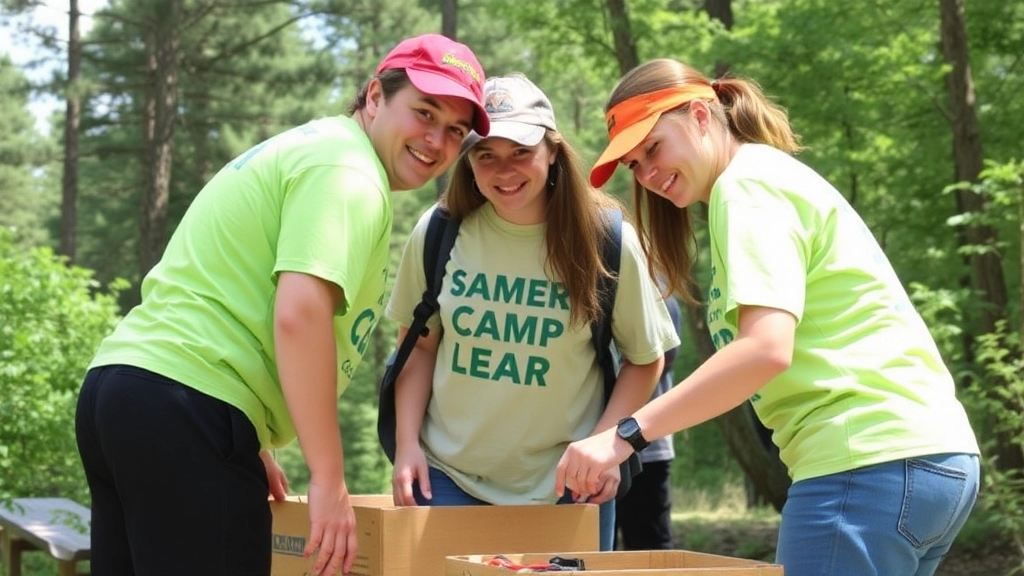Transformative Experience of Summer Camp Volunteering
Ever wondered if being a summer camp volunteer is more than just a seasonal gig? It’s a transformative experience that offers personal growth, career benefits, and lasting memories. From boosting your leadership skills to making lifelong friends, the perks are endless. This article will guide you through the benefits of volunteering, how to find opportunities, the necessary skills, the application process, and tips for a successful experience. We’ll also address potential challenges and share inspiring stories from past volunteers to show you the long-term impact of your contribution.
Getting Started
Ready to dive into the world of summer camp volunteering? Let’s break down everything you need to know to make the most of this rewarding journey. Whether you’re looking to enhance your resume, develop new skills, or simply make a difference, this comprehensive guide has you covered. From finding the perfect camp to overcoming challenges and making a lasting impact, we’ve got all the insights you need to ensure your summer camp volunteer experience is nothing short of extraordinary.
Benefits of Volunteering at Summer Camps
Why Should You Volunteer at Summer Camps?
Ever wondered if volunteering at a summer camp is worth your time? Maybe you’re thinking, âWhat’s in it for me?â or âHow can this help my future?â Well, let me break it down for you. Volunteering at summer camps isn’t just about giving back; it’s about gaining invaluable experiences that can shape your life and career.
Personal Growth and Development
Volunteering at summer camps can boost your personal growth in ways you might not expect. Here’s how:
- Leadership Skills: Leading a group of kids or organising activities hones your leadership abilities.
- Communication: Talking to children, parents, and other volunteers improves your communication skills.
- Problem-Solving: Every day presents new challenges, pushing you to think on your feet.
Career Benefits
Believe it or not, summer camp volunteering can make your CV shine. Employers love to see candidates who:
- Show Initiative: Volunteering demonstrates you’re proactive.
- Team Players: Working with a diverse group of people shows you can collaborate effectively.
- Adaptability: Handling unexpected situations at camp shows you can adapt to new environments.
Building Lifelong Friendships
Camps are a melting pot of people from different walks of life. You’ll meet:
- Fellow Volunteers: Share experiences and form lasting bonds.
- Campers: Influence their lives positively and get inspired by their energy and enthusiasm.
Mental and Emotional Well-being
Let’s face it; life can get stressful. Volunteering at a summer camp can be a great way to:
- Disconnect: Escape the daily grind and connect with nature.
- Feel Good: Helping others boosts your mood and mental health.
- Gain Perspective: Seeing the world through the eyes of children can be refreshing and enlightening.
Real Stories, Real Impact
Take Sarah, for example. She volunteered at a summer camp last year and said it was a game-changer for her career and personal life. “I learned more about myself in those two months than I did in years of schooling,” she shared. Sarah’s story isn’t unique; countless volunteers have found their experiences to be life-altering.
How to Find Summer Camp Volunteer Opportunities

Ever wondered how to find summer camp volunteer opportunities without losing your mind?
You’re not alone.
It’s a common question, and the good news is, it’s easier than you think.
Here’s the game plan.
Start Local
Community Centres
Pop by your local community centre. They often have bulletin boards or newsletters with volunteer gigs.
Schools and Universities
Check with schools. They might know camps looking for volunteers.
Word of Mouth
Ask around. Sometimes the best leads come from friends or family who’ve been there.
Go Online
Volunteer Websites
Sites like Do-it or Volunteering Matters list opportunities.
Social Media
Follow camps on social media. They often post volunteer needs.
Camp Websites
Visit the camp’s website directly. They usually have a volunteer section.
Use Networks
Alumni Groups
If you’ve attended a camp, reach out to their alumni network.
Professional Networks
LinkedIn isn’t just for jobs. You can find volunteer roles here too.
Get Creative
Attend Events
Go to local events or fairs. Camps often have booths there.
Email Directly
If you have a camp in mind, just email them. Show your interest.
Join Forums
Online forums and groups can be goldmines for opportunities.
Quick Tips
- Research: Know what type of camp suits you.
- Be Proactive: Don’t wait for opportunities to come to you.
- Stay Open: Be flexible with roles and locations.
Finding the right summer camp volunteer opportunity can be a breeze if you know where to look.
Skills and Qualifications Needed
Alright, let’s get real. You’re probably wondering, “Do I have what it takes to volunteer at a summer camp?” It’s a legit question and one that deserves a straightforward answer. Volunteering at a summer camp isn’t just about showing up; it’s about bringing a set of skills and qualifications that can make the experience awesome for both you and the campers.
What Skills Do You Need?
First off, communication skills are a must. You’ll be interacting with kids, fellow volunteers, and camp staff. Being able to express yourself clearly and listen actively is crucial. Think of it this way: If you can explain a board game to a 7-year-old without losing your cool, you’re on the right track.
Next up, leadership skills. Camps often look for people who can take charge, whether it’s leading a group activity or stepping in during a tricky situation. You don’t need to be a drill sergeant, but having a knack for guiding and motivating others is a big plus.
Problem-solving skills are also key. Kids are unpredictable. One minute they’re angels, the next they’re staging a mini-rebellion. Being able to think on your feet and come up with quick, effective solutions is vital.
Qualifications That Matter
Now, let’s talk qualifications. While some camps might have specific requirements, generally, they look for:
- First Aid and CPR Certification: Safety first, right? Knowing how to handle emergencies can make you an invaluable asset.
- Background Check: Camps want to ensure the safety of their campers, so expect to go through a background check.
- Experience with Children: Whether it’s babysitting, tutoring, or previous camp experience, having a background working with kids can set you apart.
Soft Skills to Make You Shine
Beyond the obvious, there are some soft skills that can make you a standout volunteer:
- Patience: Kids can test your limits. Keeping your cool is essential.
- Empathy: Understanding and sharing the feelings of others can help you connect with campers on a deeper level.
- Flexibility: Camps can be chaotic. Being adaptable will help you roll with the punches.
Real Talk: Examples from the Field
Let me break it down with a story. I remember this one volunteer, Sarah. She had no formal qualifications but was a natural with kids. Her secret? She was a great listener and had an endless supply of patience. She turned out to be one of the best volunteers because she could connect with the campers and make them feel heard and valued.
Application Process for Summer Camp Volunteers

So, you’re thinking about volunteering at a summer camp, but you’re not sure where to start, right?
First off, how do you even apply?
Don’t worry, it’s simpler than you might think.
Here’s a breakdown:
1. Research Camps
Start by finding camps that align with your interests.
- Do you love working with kids?
- Are you into outdoor activities?
- Maybe you’re passionate about arts and crafts?
Once you’ve got a list, dive into their websites.
2. Check Requirements
Most camps have specific needs.
- Some want previous experience.
- Others might need certain certifications (like CPR).
Make sure you fit the bill before you apply.
3. Prepare Your Documents
You’ll usually need:
- A CV or resume
- A cover letter explaining why you want to volunteer
- References
Pro tip: Tailor your cover letter to each camp. Show them you’re genuinely interested.
4. Submit Your Application
Most camps have an online application process.
- Fill out the forms.
- Attach your documents.
- Hit submit.
Easy peasy.
5. Interview
If they like what they see, you’ll get an interview.
- This could be over the phone, via Zoom, or in person.
Be yourself. Camps want to see your personality shine through.
6. Background Check
Safety first, right?
- Camps will likely run a background check.
- Be prepared to provide any necessary info.
7. Training
Once you’re in, you’ll probably need to go through some training.
- This could be online modules.
- Or an in-person orientation.
8. Pack Your Bags
Congrats, you’re in!
- Time to prepare for an unforgettable summer.
Quick Recap:
- Research camps
- Check requirements
- Prepare your documents
- Submit your application
- Ace the interview
- Pass the background check
- Complete training
- Pack your bags
Tips for a Successful Volunteering Experience
So, you’re thinking about volunteering at a summer camp? Awesome! But let’s be real, it’s not just about showing up. You want this to be a win-win for you and the kids. Here are some killer tips to make your volunteering experience a smashing success.
1. Understand the Camp’s Mission
First off, know what you’re signing up for. Each camp has its own vibe and mission. Are they all about sports, arts, or maybe environmental education? Knowing this will help you align your efforts and make a bigger impact.
2. Be Prepared
Preparation is key. Here’s a quick checklist to get you started:
- Read the handbook: Most camps will give you a guide. Read it. Twice.
- Pack smart: Bring essentials like sunscreen, bug spray, and a reusable water bottle.
- Know your role: Understand your responsibilities and the daily schedule.
3. Communicate Effectively
Good communication can make or break your experience. Here’s how to nail it:
- Listen actively: Whether it’s a kid or a fellow volunteer, make sure you’re really hearing them.
- Be clear and concise: Especially with kids, keep instructions simple.
- Use positive reinforcement: Encourage and praise good behaviour.
4. Stay Flexible
Things won’t always go as planned. And that’s okay! Be ready to adapt and roll with the punches. Flexibility is a game-changer.
5. Engage with the Kids
Your main job is to be there for the kids. Here’s how to make a real connection:
- Be approachable: Smile, be friendly, and show genuine interest.
- Participate: Don’t just supervise, join in on the activities.
- Share stories: Kids love hearing about your experiences. It makes you relatable.
6. Keep Safety a Priority
Safety should always be your top concern. Here are some must-dos:
- Know the emergency procedures: Familiarise yourself with the camp’s safety protocols.
- Keep an eye out: Always be vigilant, whether it’s during activities or free time.
- First aid: Basic first aid knowledge can be a lifesaver.
7. Network and Build Relationships
Volunteering is also a fantastic networking opportunity. Connect with other volunteers, staff, and even parents. You never know where these relationships might lead.
8. Reflect and Learn
After each day, take a moment to reflect. What went well? What could you improve on? This self-assessment will help you grow and make the most of your experience.
Real Talk: Challenges and How to Overcome Them
Let’s not sugarcoat it. There will be challenges. Maybe a kid is having a tough day, or you’re feeling overwhelmed. Here’s how to tackle them:
- Stay patient: Patience is your best friend.
- Ask for help: Don’t hesitate to seek advice from seasoned volunteers or staff.
- Take breaks: It’s okay to step away for a moment to recharge.
Stories from Past Volunteers
Take it from Jane, who volunteered at a nature camp last summer. She faced a shy group of kids initially but broke the ice by sharing her own camping stories. By the end of the week, those kids were leading nature walks and spotting wildlife like pros.
Long-Term Impact of Volunteering at Summer Camps
And remember, the impact of your volunteering isn’t just short-term. You’re shaping young lives and building skills that will stick with you forever. Trust me, the benefits are endless.
Challenges and How to Overcome Them

Ever wonder if volunteering at a summer camp might be tougher than it seems? It’s a common worry.
You’re not alone.
Let’s break it down.
Challenge 1: Feeling Overwhelmed
First day at camp, and it feels like chaos.
Kids everywhere.
Schedules flying around.
Solution:
- Prioritise Tasks: Focus on one thing at a time.
- Ask for Help: Don’t hesitate to lean on fellow volunteers.
- Stay Organised: Keep a checklist.
Challenge 2: Communication Hiccups
Ever struggle to get your point across?
Kids have their own language.
Solution:
- Keep it Simple: Use clear, straightforward language.
- Be Patient: Give them time to process.
- Use Visuals: Sometimes a picture says it all.
Challenge 3: Managing Behaviour
Kids can be unpredictable.
One minute they’re angels, the next… not so much.
Solution:
- Set Clear Boundaries: Kids need to know what’s expected.
- Stay Calm: Keep your cool, even when they don’t.
- Positive Reinforcement: Reward good behaviour.
Challenge 4: Homesickness
Kids miss home.
And sometimes, you might too.
Solution:
- Engage Them: Keep them busy with fun activities.
- Be Supportive: Listen and empathise.
- Share Stories: Talk about your own experiences.
Challenge 5: Physical Exhaustion
Long days.
Non-stop activities.
Solution:
- Pace Yourself: Take breaks when needed.
- Stay Hydrated: Water is your best friend.
- Eat Well: Fuel your body with good food.
Challenge 6: Emotional Stress
Handling kids’ emotions can be draining.
Solution:
- Debrief with Peers: Talk it out with other volunteers.
- Practice Self-care: Take time for yourself.
- Stay Positive: Focus on the rewarding aspects.
Real Talk:
I remember my first camp.
I felt like I was in over my head.
But by tackling each challenge one step at a time, I found my groove.
Stories from Past Volunteers
What’s it Really Like to Volunteer at a Summer Camp?
Ever wondered what it’s like to volunteer at a summer camp? Maybe you’re thinking, “Is it worth my time?” or “Will I really make a difference?” Let’s dive into some real stories from folks who’ve been there, done that, and got the T-shirt.
The First Day Jitters
Sarah’s Story:
I remember my first day at camp like it was yesterday. I was nervous, wondering if I’d connect with the kids or if I’d just be another adult they had to listen to. Turns out, the kids were just as nervous as I was. The key was to be genuine. Within hours, we were laughing and sharing stories. It was all about breaking the ice and being approachable.
Building Lifelong Skills
Tom’s Experience:
Volunteering at camp taught me more than I ever expected. I didn’t just learn how to organise activities; I picked up leadership skills, patience, and the ability to think on my feet. Here’s what I gained:
- Leadership: Managing a group of energetic kids.
- Patience: Handling unexpected situations with calm.
- Problem-solving: Quick thinking when plans changed.
Overcoming Challenges
Emma’s Challenge:
One challenge I faced was dealing with homesick campers. It was tough seeing them upset, but I learned to comfort and distract them with activities. Here’s how I did it:
- Listen: Let them express their feelings.
- Engage: Involve them in fun, engaging activities.
- Reassure: Remind them of the fun planned for the day.
The Joy of Making a Difference
Jake’s Impact:
The best part? Seeing the impact I made. One camper told me I inspired them to be more confident. That’s when I realised, I wasn’t just volunteering; I was shaping futures.
Long-Term Connections
Lucy’s Reflection:
Even after camp ended, I stayed in touch with some of the kids and fellow volunteers. We built a community that extended beyond the summer. It’s like having a second family.
Why You Should Consider Volunteering
Volunteering at a summer camp isn’t just about giving; it’s about growing. You’ll gain skills, create memories, and make a real impact. If you’re on the fence, take the leap. You won’t regret it.
For more insights on the benefits of summer camps, check out our guide on summer camp benefits for preschoolers and our list of top summer camps for teens.
## Long-Term Impact of Volunteering at Summer Camps
Ever wonder if volunteering at a summer camp is worth your time?
I get it. You’re probably thinking, âWhat’s the point?â
Let’s break it down.
### Building Lifelong Skills
Volunteering at a summer camp isn’t just about the kids.
It’s about you too.
You’ll pick up skills like:
– Leadership
– Communication
– Problem-solving
These aren’t just buzzwords.
They’re the real deal.
### Networking Opportunities
You’ll meet people.
Not just any people.
People who can open doors for you.
Camp directors, fellow volunteers, even parents.
These connections can lead to job offers, references, and lifelong friendships. Discover more about [networking at summer camps](https://summercamp.blog/seas-live-event-summer-camp-cybersecurity-networking/).
### Boosting Your CV
Employers love seeing volunteer work on a CV.
It shows you’re proactive.
You care.
You’re not just about the 9-to-5 grind.
### Personal Growth
You’ll learn a lot about yourself.
Your strengths.
Your weaknesses.
How you handle stress.
It’s like a crash course in personal development.
### Making a Difference
You’re not just a volunteer.
You’re a role model.
Kids look up to you.
They remember you.
Years down the line, you’ll hear stories about how you made a difference. Learn more about [making an impact at summer camps](https://summercamp.blog/explore-summer-camp-culture-activities-traditions/).
### Real-Life Examples
Take Sarah, for example.
She volunteered at a summer camp for three years.
Now, she’s a youth counsellor.
Or John.
He made connections at camp that led to a job in outdoor education.
FAQs on Summer Camp Volunteering
How can I find summer camp volunteer opportunities?
Finding summer camp volunteer opportunities can be straightforward if you know where to look. Start by checking local community centres, schools, and universities. You can also explore online resources like volunteer websites, social media, and camp websites. Networking through alumni groups and professional networks can also yield opportunities. Don’t forget to get creative by attending local events, emailing camps directly, and joining online forums.
What should I consider before applying to volunteer at a summer camp?
Before applying, research camps that align with your interests. Check the specific requirements of each camp, such as previous experience or certifications like CPR. Prepare your documents, including a CV, cover letter, and references. Tailor your cover letter to each camp to show genuine interest.
What is the typical application process for summer camp volunteers?
The application process generally involves researching camps, checking their requirements, preparing necessary documents, and submitting an online application. If selected, you’ll go through an interview, background check, and possibly training before starting your volunteer role.
What challenges might I face as a summer camp volunteer, and how can I overcome them?
Volunteering at a summer camp can come with challenges such as feeling overwhelmed, communication issues, managing behavior, homesickness, physical exhaustion, and emotional stress. Overcome these by prioritizing tasks, asking for help, using clear communication, setting boundaries, engaging in activities, pacing yourself, and practicing self-care.
How can I effectively manage behavior at a summer camp?
Managing behavior involves setting clear boundaries, staying calm, and using positive reinforcement. Kids need to know what is expected of them, and rewarding good behavior can encourage them to follow rules.
What should I do if I or the kids feel homesick?
To combat homesickness, keep kids engaged with fun activities and be supportive by listening and empathizing. Sharing your own experiences can also help them feel more comfortable.
How can I handle physical and emotional stress while volunteering?
To handle physical stress, pace yourself, stay hydrated, and eat well. For emotional stress, debrief with peers, practice self-care, and focus on the rewarding aspects of volunteering.
What are some quick tips for finding the right summer camp volunteer opportunity?
Some quick tips include researching camps to find one that suits you, being proactive in seeking opportunities, and staying flexible with roles and locations. Knowing what type of camp aligns with your interests can make the search easier.

